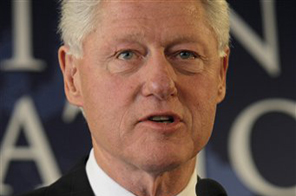SKorea trying to free citizens
SEOUL: South Korea's president said Friday the country is "doing everything it can" to win the release of its citizens detained in North Korea, after former President Bill Clinton brought home two American journalists.
The release of reporters Euna Lee and Laura Ling raised calls for Seoul to do more for five South Koreans being held in the North, one since late March.
With ties between the Koreas at a historic low, Pyonyang has refused to talk about the detainees, and South Korea has ruled out the possibility of sending an envoy to negotiate their release.
South Korean and Japanese officials said Clinton urged the North to free the South Koreans and to address a decades-old abduction of Japanese citizens during his landmark trip to Pyongyang earlier this week that included a rare meeting with leader Kim Jong Il.
"The government is doing everything it can" to win the freedom of a South Korean who worked a joint factory complex in the North and four fishermen abducted when their boat strayed into northern waters, President Lee Myung-bak said via his spokesman. "The government is fully aware of the concern and interest the people have in this issue.
Lee did not elaborate on what measured were being taken, but he added that Seoul and Washington had fully coordinated on the American journalists' release.
Though Pyongyang has publicly refused to talk about the South Koreans it is holding, Seoul's Dong-a Ilbo newspaper reported Friday that the isolated regime had indicated it was willing to negotiate the worker's release when the chairwoman of Hyundai Asan, a South Korean firm with close business ties to the regime, visited Tuesday.
The paper, which cited unidentified government officials, said Hyun's deputy plans to travel to the industrial complex next week, and could bring the detained worker home.
Hyundai Asan denied the report, saying North Korean officials made no mention of the captive worker during the chairwoman's trip.
The company said its president could make a routine visit to the North next week.
South Korea's Unification Ministry spokesman Chun Hae-sung said he is not aware of the North's making such a suggestion. Deputy spokeswoman Lee Jong-joo also said there was no mention of the held worker in a Hyundai Asan report to the government on the chairwoman's trip.
On Thursday, Seoul's Foreign Ministry spokesman Moon Tae-young said he understood that Clinton conveyed to North Korea that the South Korean worker and fishermen "should be released on humanitarian grounds." He said South Korea hasn't heard how the North Koreans reacted.
In Tokyo, Chief Cabinet Secretary Takeo Kawamura told reporters that "Clinton urged Kim Jong Il to make progress" on the issue of abducted Japanese nationals. He cited an unidentified senior U.S. government official as the source of the information.
In 2002, North Korea admitted abducting 13 Japanese nationals in the 1970s and '80s and using them to train spies. North Korea allowed five to return to Japan, saying the other eight had died.
But Tokyo wants a deeper investigation.
In Washington, State Department spokesman Robert A. Wood declined to discuss whether Clinton had interceded with Kim on behalf of the detained South Koreans and Japanese.
Wood said Clinton's trip to North Korea was a private, humanitarian mission, and if he spoke to Kim about the detainees, he was "not carrying any messages on the part of American officials." Nevertheless, Clinton's trip has rekindled concerns among some in South Korea and Japan that the two countries could be marginalised if Washington consents to direct talks with Pyongyang its nuclear program.
North Korea has quit six-nation disarmament talks and instead recently suggested one-on-one negotiations with the U.S.
The U.S. has said it is willing to hold direct talks with Pyongyang - but only on the sidelines of the six-nation nuclear talks, which also include China, Japan, Russia and South Korea.






